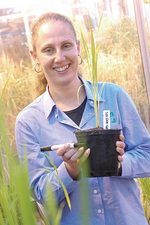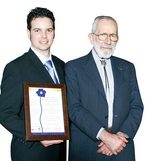Young researchers stand tall
 Science Science
A University of Adelaide scientist renowned for her research into plant diseases was last month named South Australia's 2006 Tall Poppy of the Year. Dr Amanda Able, a senior lecturer in the School of Agriculture, Food and Wine, was presented with the award by 2005 Nobel Prize winner Dr J. Robin Warren at the SA Young Tall Poppy Science Awards last month. "It is exciting to be recognised as someone who contributes to science in our community," Dr Able said. Since 2001 Dr Able has helped secure almost $2 million funding for plant-related research at the University of Adelaide. Her laboratory is a world leader in understanding the physiology of plant-pathogen interactions and postharvest disorders. In addition to her research excellence, Dr Able is passionate about educating the next generation of scientists. She was awarded the Executive Dean's Excellence in Teaching Award in 2005 and is heavily involved in promoting plant breeding and plant biotechnology to school students. "I'm really looking forward to visiting school students over the next year and getting them interested in science as a career, " she said. Dr Melanie McDowall, a postdoctoral fellow at the University's Roseworthy Campus, was also one of six recipients of this year's Young Tall Poppy Science Awards. The annual awards recognise and reward individuals who have made a significant contribution to science in South Australia through their academic achievements and their community engagement in promoting science. Dr McDowall, a researcher within the Discipline of Agricultural and Animal Science, is well known for her work to improve wool traits in Merino sheep by treating pregnant ewes with nutritional supplements. She is also a project leader within the Sheep Genomics program, which aims to improve wool, meat, parasite and reproductive efficiencies of sheep by gene discovery and non-genetic manipulations. "It's an honour to receive a Tall Poppy award because there are so many bright, early career researchers in Adelaide," Dr McDowall said. "It's a credit to the School of Agriculture, Food and Wine that two of their researchers have been recognised and it's a fantastic opportunity to raise the profile of agricultural research and its importance to the Australian economy." Recent University of Adelaide graduate Dr Bradley Ferguson was also named a Tall Poppy for 2006. A senior engineer with Tenix Defence, Dr Ferguson continues to be involved with T-ray research in the School of Electrical & Electronic Engineering at the University. Dr J. Robin Warren, who received the 2005 Nobel Prize for Medicine with colleague Professor Barry Marshall, addressed the six award winners at a luncheon at the Hyatt Regency. Dr Warren, a 1961 medicine graduate of the University of Adelaide, and Professor Marshall won the Nobel Prize for their discovery of the bacterium Helicobacter pylori and its role in gastritis and peptic ulcer disease. The Tall Poppy Campaign was created by the Australian Institute of Political Science to promote a greater appreciation of scientific achievers and encourage younger Australians to follow in their footsteps. Story by Candy Gibson
|







